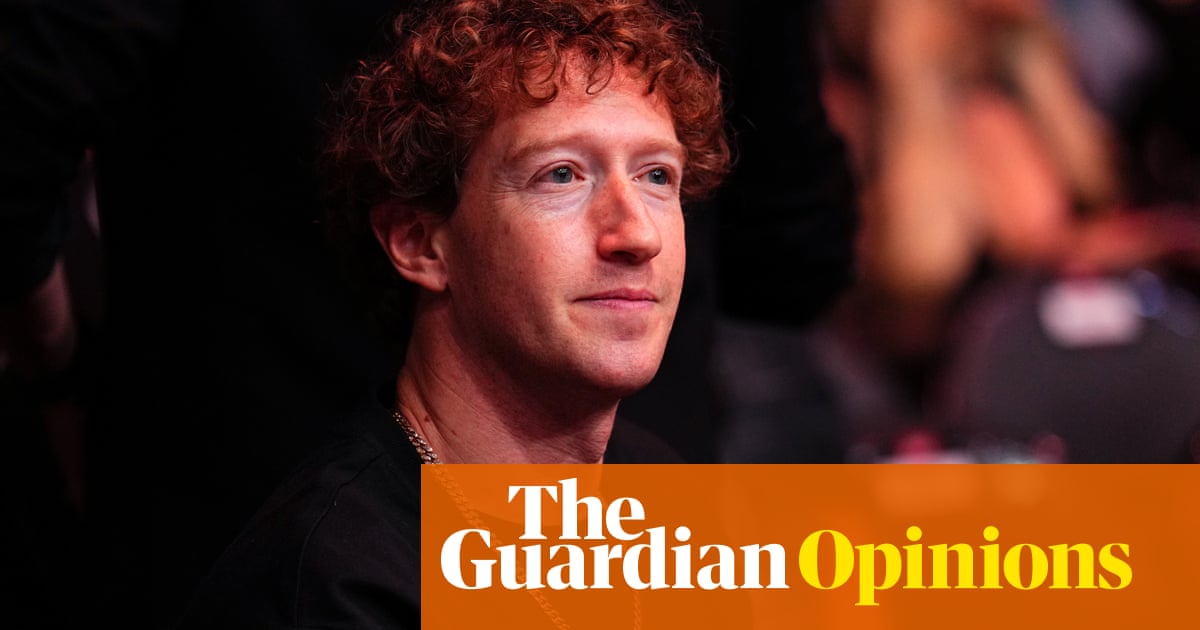Over the past few years Mark Zuckerberg has been conducting a very expensive experiment. If he grows his hair and revamps his wardrobe, will it make him seem more relatable? If he takes up mixed martial arts, goes wild boar hunting, and tells manosphere-adjacent podcasters such as Joe Rogan that companies need more “masculine energy”, will red-blooded American males respect him? With the help of a small army of stylists, personal trainers and PR gurus, could Zuck transform himself from an unlikable dork into an alpha bro?
For a brief moment, the answer to all that seemed to be a tentative “yes”. Zuck’s shock of shaggy new hair made the billionaire seem less like three Lego figures in a trenchcoat and more like an adult human male. His gold chains and jazzy new outfits sparked excited chatter of a “Zucknaissance”. The Meta billionaire also had a lucky break, PR-wise, in 2023 when Elon Musk, the world’s least self-aware man, challenged him to a cage brawl. Cue a flurry ofarticlesabout how Zuck was actually a skilled athlete who would annihilate Musk in a fight, leaving approximately 950 children without their father.
All this to say: you tried, Mark! You made a valiant effort to convince us all you’re a super-chill bro, rather than an evil tech overlord. Still, I think we can call time on the experiment now. It doesn’t matter how many system updates the ZuckBot runs – he can’t seem to escape the uncanny valley. There’s just something about him that screams “creepy automaton”.
Zuck is well aware of this, by the way, and it hurts his feelings. The billionairerecently wenton Theo Von’s podcast (Von is an extremely popular comedian and podcaster from Louisiana who interviewed Donald Trump before the election, and got a callout at Trump’s victory speech) and lamented: “People have been calling me a robot online for 20 years.” If Zuck was looking for reassurance, he didn’t get any. “There are times,” Von replied thoughtfully, “where, yeah, you seem like a guy who probably watched a video of how to be a guy on YouTube.” Those times being all the time.
Zuck’s performance on Von’s podcast certainly didn’t do much to humanise him. At one point the billionaire (who drives a Cadillac) mused: “You want your car to have as much horsepower as your helicopter.” The conversation also touched on Zuckerberg’s$270m apocalypse shelterin Hawaii, which he described as “more of an underground storage situation” than a bunker. What is he storing in it exactly? Not Nespresso pods.Zuck told Von he only drinks coffee“recreationally” while on vacation and generally prefers “rawdogging reality”.
While Mr Facebook is busy “rawdogging reality”, he seemingly wants the rest of us to live in a dystopian digital bubble that he controls and profits from. During another recent podcast interview, this one withDwarkesh Patel, Zuckerberg announced that the “average American” has fewer than three friends but “demand for meaningfully more”. Meta, he said, is going to fill thatdemand, and solve the loneliness epidemic, with AI chatbots. Indeed, the Meta CEO is so eager to roll out these digital companions that, according to a recent Wall Street Journal investigation, there are so few guardrails around the bots that they are willing to have sexual discussions with underage users. Meta has said it has now fixed this problem but it’s yet another example of Zuckerberg’s longstanding habit of moving fast and breaking things.
If we’re very lucky, however, Meta may find itself being broken up next. Zuckerberg has been bending his knee to the president (who he praised as a “badass”) and recently bought anugly$23m mansionin Washington DC that will enable him to more easily lobby Trump. Facebook has implementedRepublican-friendly policies, and the Chan Zuckerberg Initiative, Zuckerberg’s family’s for-profit charity organisation, has beenbusy guttingall its DEI efforts in an attempt to appease Trump.
Despite all this grovelling, however, the billionaire hasn’t been able to wriggle out of anexistential anti-trust trial. The US Federal Trade Commission is arguing that Meta built an illegal monopoly by acquiring Instagram and WhatsApp and aims to unwind those deals – which would massively dent Meta’s profits.
Bad things never seem to happen to bad people any more, however, so I am not holding my breath that Zuckerberg will have any sort of fall from grace. The more likely scenario is that Zuck persuades Trump to stop the case and he celebrates the completion of his villain arc in his underground bunker with a special-occasion coffee and five of his closest AI bot friends.
Arwa Mahdawi is a Guardian columnist
